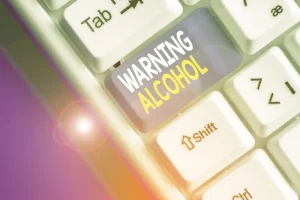
While it may seem like anger is the most common emotion caused by alcohol, it is not always the case. Some people become chatty and confident, while others crave intimacy and closeness. Alcohol can also make https://ecosoberhouse.com/article/what-to-do-if-you-cant-sleep-without-alcohol/ some people more emotional than usual, causing them to cry more easily. For example, suppose you see a friend or person in your surroundings with violent behavior after drinking alcohol.

Cognitive Function

Plus, we provide aftercare to ensure that once the residential stage ends, support continues as the individual returns to daily life. Seeing a loved one switch from gentle to hostile after a few drinks can be scary and confusing. alcoholism and anger Over time, this can wear down relationships or create an environment where family members feel unsafe. As you can imagine, alcohol-related aggression can have far-reaching and severe unintended consequences.
- Being at the opposite end of someone with alcohol-related anger outbursts can be scary and painful.
- If encountered, it can be an extremely difficult situation to endure, however, some pointers may help deal with it.
- However, early management of these factors can lessen the chances of developing alcohol-related aggressiveness.
- Removing potential weapons and keeping a safe distance helps to keep these individuals safe.
- But for many, the experience of drinking can take a darker turn, leading to unexpected anger, aggression, or emotional outbursts.
Impaired emotional regulation, decision-making, and impulse control
Anger is an emotion made up of many different feelings like dissatisfaction, displeasure, hurt, and frustration. It’s a natural human response when life seems unfair or something valuable is under threat. When people are drunk, they may experience a phenomenon called “alcohol myopia,” which involves losing their sense of perception. As a result, they may be overly aggressive in situations where they would normally notice the cues that tell them to think drug addiction treatment more rationally. Alcohol impairs cognitive function, making it difficult to problem-solve, control anger, and make good decisions.

Financial support and sponsorship
Anger can be one of the most triggering emotions, so it’s important to create a strong plan for handling feelings of anger when they do arise in early sobriety. Ultimately, finding ways to truly process anger will allow it to become less intense, less frequent, and more manageable over time. Alcohol use disorder, or AUD, is not only detrimental to the individual struggling with their drinking.
Third, including both cognitive and relaxation coping skills provides a range of coping skills to assist most individuals with anger problems, i.e., this intervention addresses anger issues for most people. Return to problematic drinking often occurs after treatment for alcohol dependence, even when that treatment was initially successful. Relapsed individuals often start another negative cycle of alcohol-related problems and suffering in themselves and others (Lowman et al., 1996; Marlatt & Gordon, 1980). Notwithstanding the progress that has been made in the alcohol use disorders treatment field, innovative treatment strategies are still needed. Some people are more prone to anger and aggression when drinking due to a combination of biological, psychological, and environmental factors. Genetics, for instance, can play a role in how your body processes alcohol and how it affects your mood.
In addition to the tips above, there are several techniques that can help you address feelings of anger in the moment they arise. Practicing an anger management technique can help you recognize when you’re angry and gain a sense of control before taking action. In early sobriety, physiological changes in the brain and body can exacerbate feelings of anger and frustration.
- Anger also contributes to relapse via psychological and interpersonal influences.
- Addressing both anger and drinking is crucial, with professional help highly recommended.
- Offering reassurance and support can help alleviate feelings of distress and frustration.
- This allowed us to model clients as random factors and to nest repeated measures within each client.
- If drinking causes a blackout, you may not even remember being aggressive unless someone reminds you about it.
- Although impulse control and alcohol abuse are separate disorders, they often share common features.
- Sunshine Behavioral Health strives to help people who are facing substance use disorder, addiction, mental health disorders, or a combination of these conditions.
- By addressing the underlying causes of your anger and making healthier choices, you can break the cycle and create a more balanced, fulfilling life.
This impairment can lead to emotional outbursts and, ultimately, to destructive behaviors that can harm your relationships. People going through difficult times may turn to alcohol as a coping mechanism, only to find that it amplifies their negative emotions. This can lead to a vicious cycle of drinking to cope with stress, experiencing alcohol-induced anger, and then drinking more to deal with the consequences of that anger. An angry drunk is someone who becomes hostile, aggressive, or violent when under the influence of alcohol. While not everyone who drinks becomes aggressive, for some, alcohol acts as a trigger, unleashing a torrent of pent-up emotions and unresolved issues. The prevalence of alcohol-related aggression is alarmingly high, with studies suggesting that up to 50% of violent crimes involve alcohol consumption.
